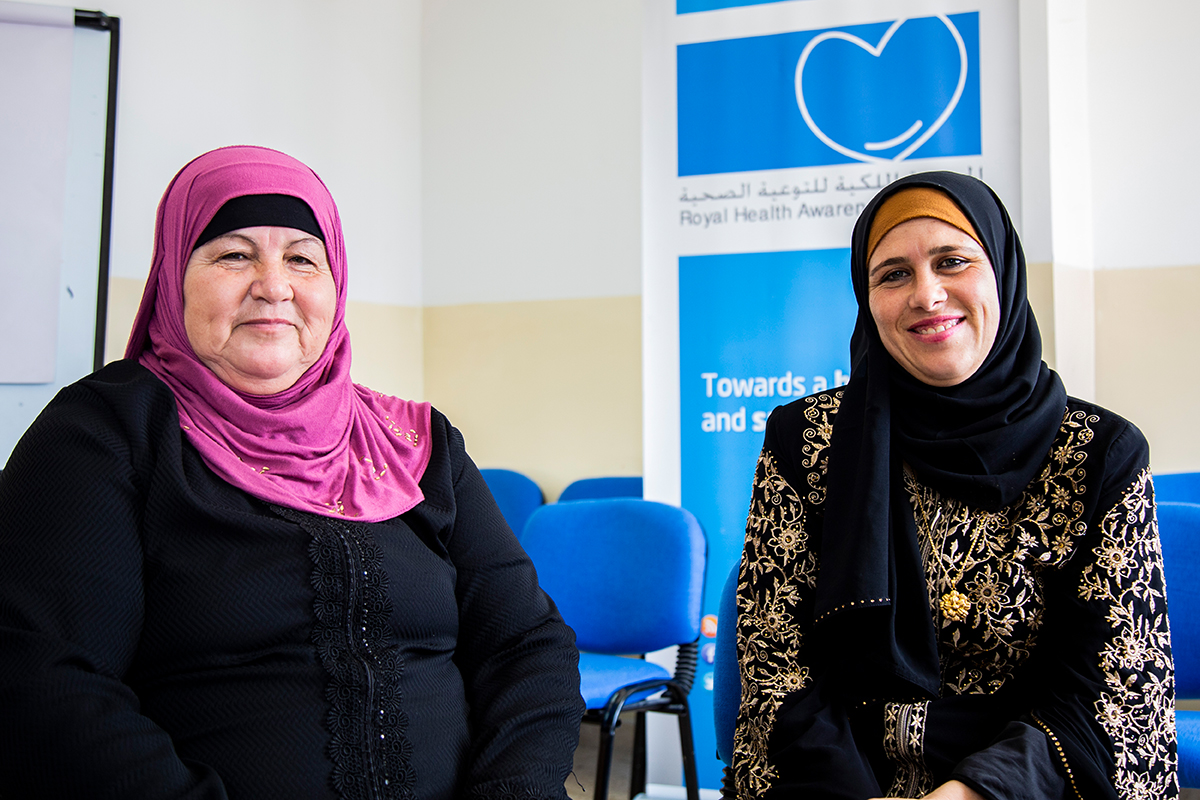
A mother and daughter participated in the patient education program at a clinic in Irbid, Jordan.
Photo by Kathy Kukula, Americares
CHAMPAIGN, Ill. — People who participated in a health education program that included both mental health and physical health information significantly reduced their risks of cardiovascular disease and other chronic diseases by the end of the 12-month intervention – and sustained most of those improvements six months later, researchers found.
People who participated in the integrated mental and physical health program maintained significant improvements on seven of nine health measures six months after the program's conclusion. These included, on average, a 21% decrease in fasting blood sugar, a 17% decrease in low-density lipoprotein cholesterol and a 12% decrease in their body mass index.

Social work professor Tara Powell found that people at risk of cardiovascular disease achieved significant improvements in their weight, blood pressure and other metrics that lasted six months after completing an informational program that included both physical health and mental health information.
Photo by L. Brian Stauffer
However, patients in the group that focused only on physical health information maintained their improvements on just two risk factors – BMI and systolic blood pressure.
Data collected at the conclusion of the 12-month intervention indicated that patients in the program with the mental health component improved on eight of nine health measures, while their peers in the traditional program improved on just three.
"The gains achieved by patients in the integrated program were greater than those of their counterparts in the other group and had greater lasting effects," said University of Illinois Urbana-Champaign social work professor Tara M. Powell, the first author of a study on the project, published in the journal Preventive Medicine Reports.
Study participants were 213 Syrian refugees and 382 Jordanians who were patients of three health clinics in Irbid, Jordan, a border community that has experienced a large influx of people fleeing the civil war in Syria.
Powell conducted the research in partnership with the health-focused relief and development nonprofit organization Americares and the Royal Health Awareness Society, Jordan.
Powell's group explored the efficacy of a health education intervention called the Healthy Community Clinic, delivered in clinics throughout Jordan to improve patients' management of chronic conditions such as cardiovascular disease and diabetes, and reduce their risks of complications. Trained health educators or nurses led 20 interactive educational sessions that patients attended twice a month for one year.
Patients' outcomes in the traditional HCC program were compared with those of peers who received routine health care only and with a group who participated in an expanded HCC program that integrated four additional sessions focused on mental health.
The mental health sessions included discussions of topics such as grief and physical and emotional traumatic stress reactions. Participants also learned tangible coping skills for reducing emotional distress such as deep-breathing exercises and walking.
"This study is among the first to illustrate how an integrated physical and mental health educational intervention can improve health outcomes and ultimately help reduce cardiovascular disease risk in refugees and low-income populations," said co-principal investigator Dr. Shang-Ju Li, Americares' senior director of monitoring and evaluation. "We are thrilled to share this groundbreaking research and look forward to making even more progress as we continue to look for ways to improve health outcomes for people affected by poverty or disaster."
Additional co-authors of the study were Michelle Thompson, an associate director of emergency response, Americares; sociology graduate student Yuan Hsiao of the University of Washington; Aseel Farraj, a program manager of the Royal Health Awareness Society; Mariam Abdoh, a senior population and health advisor/project management specialist, USAID; and Dr. Rami Farraj, of the King Hussein Medical Center.
Based upon the findings of this research, the Royal Health Awareness Society has since deployed the HCC with the mental health component to public health centers across Jordan, Powell said.
In a prior study with the same participants that examined the impact of social support on mental and physical health, Powell and her colleagues found that more than half of the participants had experienced at least one traumatic event. Among Syrians, the most frequently reported traumatic experience was living in a war zone (73%), while among Jordanians it was witnessing a violent death (18%).
That study, published in PLOS ONE, was co-written by Li, Hsiao and U. of I. graduate student Oe Jin Shin.
"Because mental health conditions such as depression and anxiety often co-occur with chronic physical problems and with poverty, patient education programs that integrate mental and physical health information are critical for countries such as Jordan," Powell said. "Making these integrated programs widely available can reduce the burden of noncommunicable diseases on marginalized populations and increase their access to care."






